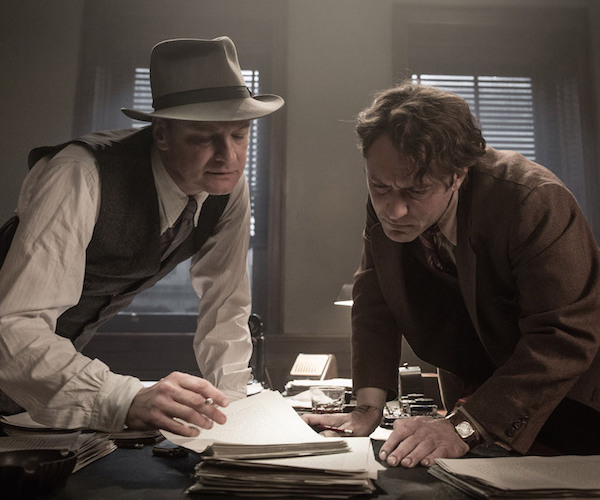Film Review: “Genius”? Oh, Really?
Unfortunately for Genius, film is a visual medium, not a talking heads snore fest.
Genius, directed by Michael Grandage. At the Lexington Venue.

A scene from Genius featuring Jude Law and Colin Firth.
By Paul Dervis
How does one convey genius on celluloid? If the new Michael Grandage film, based on a book about the legendary editor Max Perkins by A. Scott Berg, is any indication, you don’t. You just throw out line after line extolling the masterful ideas of one of the 20th Century’s most acclaimed American novelists and let the audience take it from there.
Unfortunately for this project, film is a visual medium, not a talking heads snore fest. And this biopic, focusing on the interrelationships between Thomas Wolfe of Look Homeward, Angel fame and Perkins, his editor at Scribner, as well as their small circle of friends and lovers, does not have the galvanic power of words that the works it pays homage to possess.
Though the title of the film is Genius, the script and performances exhibit little that merit this description.
Max is the genius editor of the publishing house, having already assured slots in history because of his high grade clients Ernest Hemingway and F. Scott Fitzgerald. A colleague asks Max a favor. Would he read a massive manuscript by an unknown writer, a tome that has been rejected by virtually every other publisher in New York? Nothing if not a good (and curious) soldier, Max agrees.
Turns out that the manuscript, though unwieldy, is a real page turner. He reads it in the office. He reads it on the commuter train home. He reads it through the night. When the house because too noisy because of his collection of teenage daughters, he reads in a closet.
He simply cannot put it down.
In the morning, he has a check cut for the young Tom Wolfe and a contract to boot. It’s going to be a challenge to edit this indulgent epic, but Max believes that — once all the useless adjectives are cleared — the book’s greatness will be evident.
Of course, the novel is Look Homeward, Angel and a star is born.
But Wolfe quickly morphs from an exuberant Southern hayseed to a pretentious, yet paranoid jet setter. He drops his mistress, a married set designer who was keeping him, as well as encouraging him, through his impoverished period. She’s a bit off-balanced herself and wields a pistol in Max’s office, trying to decide who she should shoot — Wolfe, Max, or maybe herself? She decides on none of the above.
Although history tells us how the story plays out, the performances do nothing to add suspense to the tale. And the film does all too little with a cast of usually good actors.
Jude Law, who was solid in Wes Anderson’s fanciful ensemble film The Grand Budapest Hotel a couple of years back, can only be described here as a classic scenery chewer. He barely delivers a line without gyrating his torso and screeching his words. It is awfully tiring to listen to and doesn’t provide the depth of emotion and psychic distress that is intended. Artists suffer — but not nonstop.
Then there is Colin Firth’s Max. As loud as Law is, Firth is silent. When he does speak, it is with a quiet monotone voice … as if everything he says must be mulled over before it leaves his mouth. He is intently working with subtle facial expressions here, his eyes doing more absorbing than communicating. Yet, if Firth’s Max sees something great in Law’s Wolfe, it isn’t conveyed to us. The overall impression is of terminal sedation — even when this Max walks, he seems to be standing still.
And there was one unintentionally comic element to Firth’s performance. This Max wore his hat in the office, the street, at the dinner table … everywhere until the funeral scene near the end. I can only assume that this is an historically accurate observation about Perkins but please, at least mention it somewhere during the movie!
And the women’s roles in Genius were absolutely wasted on the talented actresses. Nicole Kidman fought hard to bring life to Wolfe’s lover, but was completely unsupported in that effort by the director and the script penned by John Logan. Laura Linney, one of my personal favourites, was given the role of Max’s long suffering wife; what little dialogue she was given seemed to come out of a genteel soap opera from the 1950’s. Vanessa Kirby, playing the part of Zelda Fitzgerald, wasn’t, I believe, even given a line. Her job was to sit in a chair, looking pretty and damaged.
In a supporting role, Guy Pearce as F. Scott himself, gave a performance I would have expected from a TV movie, circa 1975, starring Richard Chamberlain.
It’s difficult to make a good biopic, especially about intellectuals. How to capture that special creative something they embody…..but at least give it a try, wontcha?
Paul Dervis has been teaching drama in Canada at Algonquin College as well as the theatre conservatory Ottawa School of Speech & Drama for the past 15 years. Previously he ran theatre companies in Boston, New York, and Montreal. He has directed over 150 stage productions, receiving two dozen awards for his work. Paul has also directed six films, the most recent being 2011’s The Righteous Tithe.
Tagged: Colin Firth, Genius, Jude Law, Max Perkins, Michael Grandage, Paul Dervis
